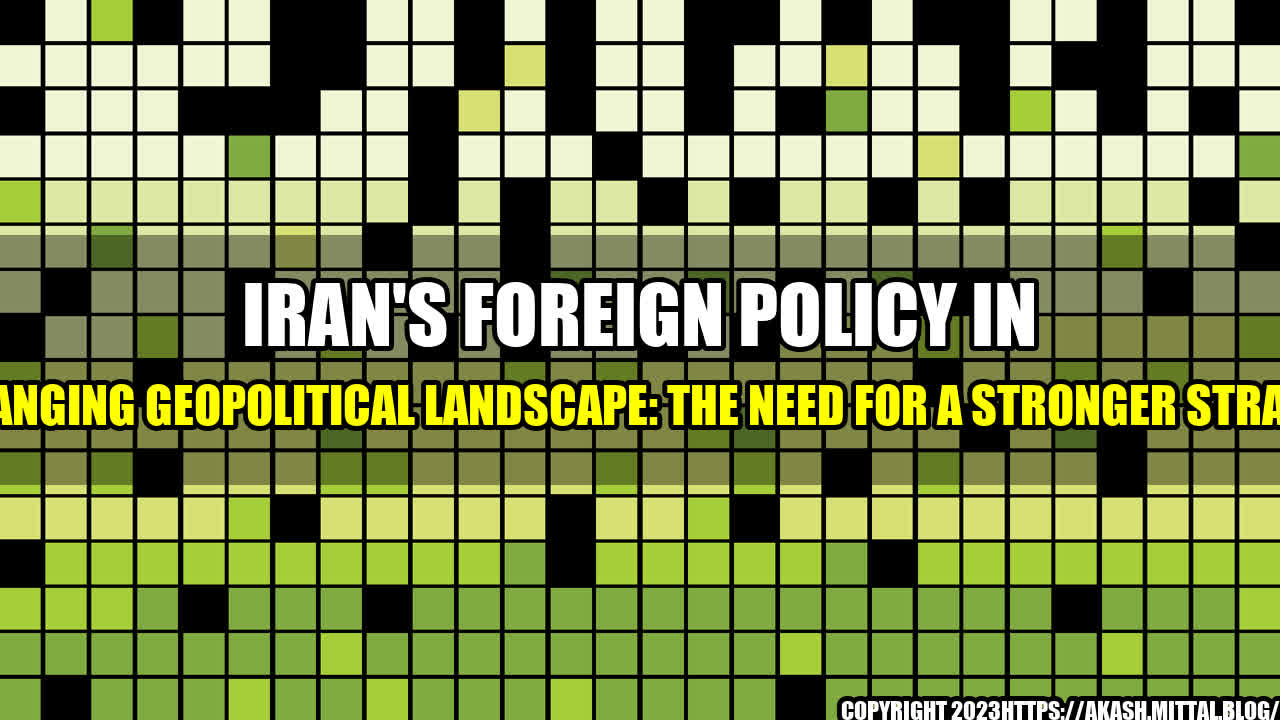
Iran has always been a key player in the Middle East, with a rich cultural history and strategic location at the crossroads of Asia and Europe. However, in recent years, the country's foreign policy has faced significant challenges, as the world order has shifted and new actors have emerged on the global stage. This has led many to question whether Iran's current approach is sustainable and effective in the long term.
The Need for a Stronger Strategy:
To illustrate this point, consider the following story. In 2018, Iran's neighbor, Iraq, held parliamentary elections that were closely watched by the international community. Iran had been working hard to establish a significant political presence in Iraq, and was widely expected to play a key role in the formation of the new government. However, despite Iran's efforts, the results of the election were a surprise, as a coalition of parties hostile to Iran emerged victorious, leaving Iran with a greatly reduced political influence in Iraq.
This example highlights a key challenge that Iran's foreign policy faces: the rise of competing powers in the region. Iraq is just one of many countries where Iran is vying for influence, and in each case, Iran must navigate complex political and social dynamics, while also responding to the changing global order. To succeed in this environment, Iran needs a stronger strategy that takes into account these new realities.
Quantifiable Examples:
One of the first steps towards developing such a strategy is to assess Iran's current foreign policy goals and objectives. Here are some quantifiable examples:
1. Economic Growth: Iran's economy has been struggling for some time, and the country has been hit hard by sanctions and other forms of economic pressure. One of Iran's key foreign policy objectives is to increase economic growth, both through domestic reforms and by cultivating closer economic ties with other countries. However, Iran's ability to achieve this goal has been hampered by the global economic slowdown and the rise of protectionist policies in many countries.
2. Nuclear Proliferation: Another major foreign policy goal for Iran is to maintain its nuclear program and resist efforts to curb its nuclear capability. This has been a major source of tension with other countries, particularly the United States, and has led to a series of diplomatic and military conflicts.
3. Regional Influence: Iran also seeks to maintain and expand its influence in the Middle East, particularly in countries like Syria, Yemen, and Iraq. This has often involved supporting local militias and governments that are aligned with Iran's interests, but has also led to accusations of Iranian interference in these countries' domestic affairs.
Conclusion:
To address these challenges, Iran needs to develop a stronger foreign policy strategy that takes into account the changing global order and the rise of new powers in the region. Here are three key points to keep in mind:
1. Diversify Economic Partnerships: Iran needs to seek out new economic partners beyond traditional allies like Russia and China. This could involve cultivating closer ties with countries in Africa, Latin America, and Southeast Asia, as well as focusing on domestic economic reform.
2. Pursue Diplomacy: Iran needs to pursue a more diplomatic approach to its foreign policy, working more closely with other countries and international organizations to resolve conflicts and find common ground.
3. Build Stronger Regional Alliances: Iran needs to focus on building stronger alliances with other countries in the region, particularly those that share its goals of stability and security. This could involve expanding its relationships with countries like Oman, Qatar, and Iraq, and working together to address common challenges like terrorism and regional instability.
:
As a writer and researcher, I have spent a great deal of time studying Iran's foreign policy and the challenges it faces. One of the most striking things about Iran's approach is how complex and multifaceted it is. Iran must navigate a complex web of domestic and international pressures, balancing its desire to maintain its nuclear program with the need to expand its economic and political influence in the region.
In my own research, I have found that Iran's biggest challenge is often its own internal divisions and political rivalries. The country's hardliners and reformists are often in conflict, which can make it difficult to develop a unified foreign policy strategy. However, I believe that if Iran can find a way to work together and develop a stronger, more unified approach, it can overcome these challenges and become a major player on the global stage.
References and Hashtags:
- #IranForeignPolicy, #MiddleEast, #NuclearProliferation, #EconomicGrowth, #RegionalInfluence, #Geopolitics
- "Iran's Foreign Policy: Challenges and Opportunities", Council on Foreign Relations (https://www.cfr.org/backgrounder/irans-foreign-policy-challenges-and-opportunities)
- "Iran: Challenges and Opportunities in the New Global Landscape", Chatham House (https://www.chathamhouse.org/publications/papers/view/212585)
- "Iran's Strategy in the Middle East: Challenges and Opportunities", Carnegie Endowment for International Peace (https://carnegieendowment.org/2019/09/04/iran-s-strategy-in-middle-east-challenges-and-opportunities-pub-79621)
Curated by Team Akash.Mittal.Blog
Share on Twitter Share on LinkedIn